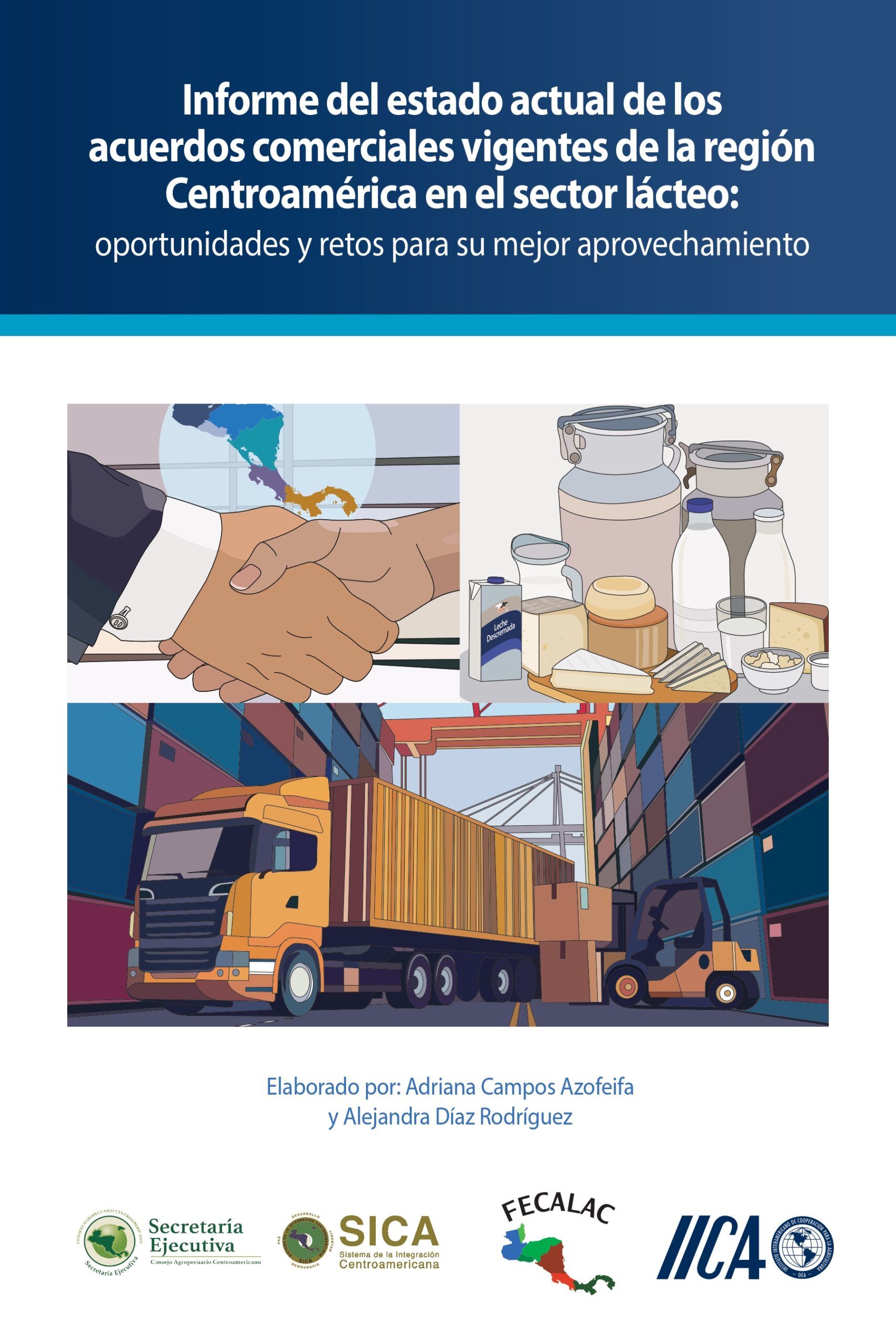A new IICA publication is aiming to ensure that Central American countries capitalize on opportunities offered by existing trade agreements.

San Jose, 23 February 2024 (IICA). A recent report by the Inter-American Institute for Cooperation on Agriculture (IICA) is maintaining that the Central American dairy sector must expand trade beyond the region and capitalize on existing trade agreements, in order to access new export markets.
The document—published in Spanish only, under the title Informe del estado actual de los acuerdos comerciales vigentes de la región Centroamérica en el sector lácteo: oportunidades y retos para su mejor aprovechamiento—provides a snapshot of the status of current trade agreements and commitments in the region, describing the level of trade liberalization achieved, the actions taken by countries to administer these agreements, and the extent to which the opportunities offered by them have been harnessed.
The report was prepared by Adrian Campos and Alejandra Díaz, IICA specialists in Trade and Agricultural Health, respectively. It highlights a series of social, environmental and economic sustainability challenges that the dairy industry faces in seeking to promote international trade in the region.
The major destination markets for Central American dairy products are the United States and the Dominican Republic, according to the document. However, there is a challenge in further strengthening extraregional trade, as most exports are sold within the region itself, which accounts for 78% of total sales.
The report also proposes that the sector should prioritize the upgrading of basic services, for example, ensuring a proper road infrastructure, rural electrification, connectivity and greater technical assistance coverage, which would facilitate increased productivity, profitability and the modernization of production processes.
In Central America, the dairy sector is sustained by more than 245,000 farmers, most of them small farmers.
The report maintains that it is crucial to facilitate these persons’ access to investments in areas such as production, trade, processing and refrigerated transportation, factors which are currently limiting the development of the sector.
Together, the formal and informal dairy sectors in Central America produce 3,189.7 million liters of milk annually. The informal market presents a particular challenge, as it now accounts for 55% of milk production in the region, with 3,500 artisanal processors, which for the most part produce substandard products for the local market with little or no monitoring from competent authorities.
Despite these challenges, in 2021 dairy exports rose to USD 458 million, with Nicaragua and Costa Rica being the major exports and Latin America, the Caribbean and North America the major destination markets.
Specialist Adriana Campos stressed that, “It is important that we strengthen agrifood and regional trade as a driver of sustainable development and food security. The publication is contributing to IICA’s efforts as part of the collective actions of the Hemispheric Partnership to assist member countries to increase trade and take advantage of the trade agreements that have been signed”.
The report concludes that producers must improve their skills, as well as their organizational and negotiating capacities, to allow them to access technological developments, education and innovation, and thereby make better use of opportunities generated in international markets.
On the other hand, specialist Alejandra Díaz remarked that, “The report spoke to the importance of promoting internal consumption of dairy products, which is still below the recommended level; and underscored the need for public policies that drive the sector. We must also address the matter of the sale of imitations and substitutes – a problem that is impacting the consumer and the development of the industry in the region”.
The report takes an in depth look at the role of organizations in improving sectoral governance, the need for better coordination among ministries and secretaries, and the importance of strengthening public policies to balance market productivity with the demands of producers and entrepreneurs.
It also indicates that the dairy sector must design and implement strategies to adapt to climate change, produce better feed and increase overall productivity. Therefore, knowledge, research, technology transfer, training, technical assistance and public-private partnerships are key to facilitating the development of efficient, profitable and sustainable production.
The document advocates for the availability of information and statistics, as the sector lacks precise and up-to-date information, which is hampering the measurement and analysis of critical variables for its development.
This IICA publication is part of joint efforts by the Executive Secretariat of the Central American Agricultural Council (SECAC), the Central American Integration System and the Central American Dairy Federation (FECALAC) to improve the competitiveness and sustainability of the regional dairy sector, by creating and disseminating public goods that promote better animal health, safety and quality, trade facilitation and greater appreciation for milk and dairy products.
The report may be downloaded from IICA’s institutional repository at: https://repositorio.iica.int/handle/11324/22025
More information:
Adriana Campos, IICA Trade Specialist.
adriana.campos@iica.int
Alejandra Díaz, IICA International Agricultural Health Specialist.
alejandra.diaz@iica.int











